Grachek – American Seafoods Group: What made America Great?
 One of these times, after one of these failed empires, the financial luminaries—that seem to want to run the world—might realize that not everything can be market- capitalized. Fishing, for example, simply does not lend itself to consistent quarterly profit numbers, or to huge monthly payments on mega-fleets targeting one or two species. Industrialization of wild fish is not good for the fish, the consumer, or even the I’m-fated-to-be-a-mogul Yale MBA grads that perpetrate these debacles. Read the rest here 12:20
One of these times, after one of these failed empires, the financial luminaries—that seem to want to run the world—might realize that not everything can be market- capitalized. Fishing, for example, simply does not lend itself to consistent quarterly profit numbers, or to huge monthly payments on mega-fleets targeting one or two species. Industrialization of wild fish is not good for the fish, the consumer, or even the I’m-fated-to-be-a-mogul Yale MBA grads that perpetrate these debacles. Read the rest here 12:20

































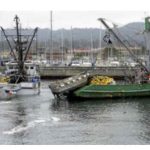

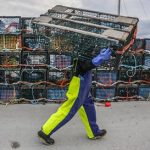



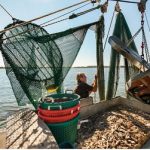
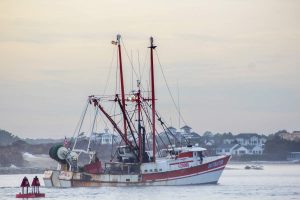

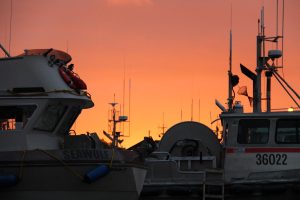


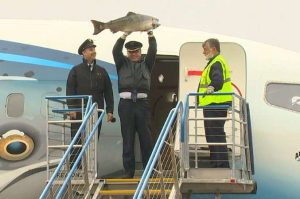



Great piece, Dick!
One truism that’s been lost over these past ensuing years, which was actually more a reality even more so than a truism: was the old saying among the fishing industry, “we may never get rich, but we’ll never go hungry!”
Jim Kendall-NBSC
Look what happened when Tyson Foods decided to get into the Fishing Business years ago. It isn’t as Cut and Dry as the Boardrooms think…
Thanks for the responses,
American Seafoods Group illustrates some of the industry-wide difficulties that should be foreboding enough to keep out the 1%er wanna’ bees. But they apparently don’t know much about fishing and lack the sense to leave things alone.
Corporatization/Privatization is at the root of the problems we “artisanal” or “regulated-community” fishermen face—and the commoditization devastation goes way beyond us, judging by the ill health of so many of the world’s economies.
We need to get “back to basics” and start producing quality products that people actually need. That is, other than pouring hundreds of millions into an attempt at a constant supply of cheap fish for the fast food giants which—as the American Seafoods Group’s dilemma indicates—is not such a smart business model, especially when it comes to “wild caught” fish. It doesn’t work out too well for the cattle or chickens that are forced into this fast food mold, either.
The only way out of this mess, I think, is to return to fisheries with the built-in constraints of the family financed and therefore, the range and weather restricted vessels. These are natural constraints on such independent fishing operations, which at times might be stressful for the particular fisherman, but overall, affords the fish a regular break due to storms and breakdowns, etc.
Many local fleets of many diverse small boat fishing operations can, and have for decades, adequately supply a fresh local product with a high degree of accountability to the consumers and with an adequate degree of sustainability for the fish and the fishery. However, in order to return to this sort of balance, the government agencies that control the fisheries would have to stop colluding with big business.
They would, for instance, need to stop complying with the demands of the lawsuit-happy big-business funded “conservation lawyers” in their ecological quest to eliminate the small boat fishing fleets—ironically this “eco-heroism” will actually eliminate the only way to sustainably produce “wild caught” fish without any outside intervention of controls or subsidies. This idea of the “eco-system” includes fishermen as one of the constraints on the fish, but who themselves are constrained by their finances and hence their size, range, etc.
A healthy small boat fishery, like any eco-system with adequate built-in constraints, if left alone, is inherently sustainable. But as soon as market-capitalized conglomerates, such as American Seafoods Group, steam in their “Super-Sized” Mega-Catcher/Processors, and when such investment demands control and constancy, when uniformity, volume, and cheapness become the order of the day, then the built-in constraints are gone, the necessary flexibility does not exist, and the flow of rolling with the natural variations in stock populations is not possible (due to debt service schedules and contract demands).
As already stated, fishing does not lend itself to meeting the unrealistic demands of such a mega-setup; but unfortunately, small fishing operations are wiped out in the process, and the built-in sustainability of the “targeted” stocks is gone so fish stock health suffers, as well. And inevitably, it seems contracted deliveries cannot be met and payments are missed, and the top-heavy “vertically-integrated” giants start to teeter. Until, of course, and as will probably occur here with American Seafoods, a new financial master-mind swoops in and buys them out for pennies on the dollar and starts the whole ill-conceived mess all over again.
Instead of the government spending billions of dollars on choking the independent fishermen in order to make room for these unrealistic empire-builder schemes; if the government would get behind and support the idea of the small boat independent fishermen as an integral part of a healthy eco-system, most of the fishery problems would go away—but then,I guess, so would many thousands of the un-regulated community’s “fish-saving jobs” go away.
Like Jim says, “We may never get rich, but we’ll never go hungry!”